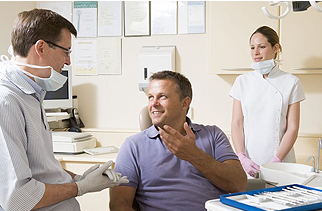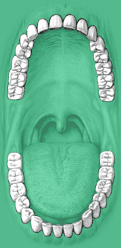⌂Main page › Dental tips › Inflammation in the mouth. How to treat it?
Inflammation in the mouth. How to treat it?
Through your mouth you ingest not only the nutrition to your body; it is billions of unwanted intruder’s crossing point as well. Get ready to defend yourself
The mouth and the pharynx is not a sterile environment, everybody has a normal mouth microbes and non-infectious bacteria resistant flora. An infection can disturb the balanced flora, causing inflammation on the mucous membrane. In the background of the mouth sores often may stand some general illness (for example diabetes, anemia, vitamin deficiencies, liver and kidney failure).

What have to know about the aphtha?
The aphtha is mainly located inside the mouth on the tongue or on the gum; its diameter is a few millimeters, very painful, bright red edged, white ulcer.
The exact mechanism of its formation is unknown yet, but mainly triggered by the infection, spicy or hot foods, hormonal factors – such as menstruation and stressful situation.
Usually goes away up to 7-10 days its own, without scars; only very rarely can be associated with fever, and with lymph nodes swelling.
It is worth to disinfect with mouthwash, and brushing which may relieve the pain and promote the healing. The appearance of the aphtha is very similar to the lesions caused by the herpes simplex virus.
The occurrence of herpes is frequent
Nearly 90 percent of the population is herpes simplex virus carrier, but only approximately by 1 percent forms lip or mouth inflammation.
First appears as small vesicles which may precede a burning feeling in that area. Then from the small vesicles develop red-edged ulcer. As a painful accompanying symptom can observe the swollen glands, fallen condition, fever, and increased saliva.
The lesion of herpes heals without a scar in 1-2 weeks, but the herpes can recurrence often in the same place. You may help the healing process with increased oral care, or with anti-virus brushing.
Stomatitis
Most frequently viral infection causing the stomatitis, but the bacterial or the mycotic infections are not rare, and various drugs (salycilates, antibiotics, prolonged use of contraceptive), chemicals (arsenic, fluorine, chlorine) caused inflammations. Bad oral hygiene, bad teeth and degraded state may predispose to the infection.
The ulcer formed mainly in the cheek’s mucosa covered with grayish plaque, and the fever is also common, the swollen glands, the loose, purulent saliva, the taste disturbance. From the funguses the Candida albicans settles the most commonly in the mouth.
Antibiotics, prolonged use of corticosteroids, radiation and chemotherapy, the weakened immune system may predispose to myotic stomatitis.
Mainly on the tongue, but in the whole mouth may appear gray-white plaque which can easily wipe off, but its bottom is hemophilic. It responses perfectly to the using of anti-mycotic brushing.
Gingivitis
The gingivitis is associated with the poor oral hygiene, with the dental decay; these may predispose to the settlement of certain pathogens which can lead to the gingivitis, later to the gingival recession.
The first symptoms include the gingival bleeding which follows later the gum’s swelling and redness. It may be very painful and if not treated in time, the gum begins to recede and the teeth loss may occur.
Such inflamed gum is more exposed to the viral infection too. The systematic dental care and dental examination help ensure that very rarely occurs or does not occur the gingival recession.




